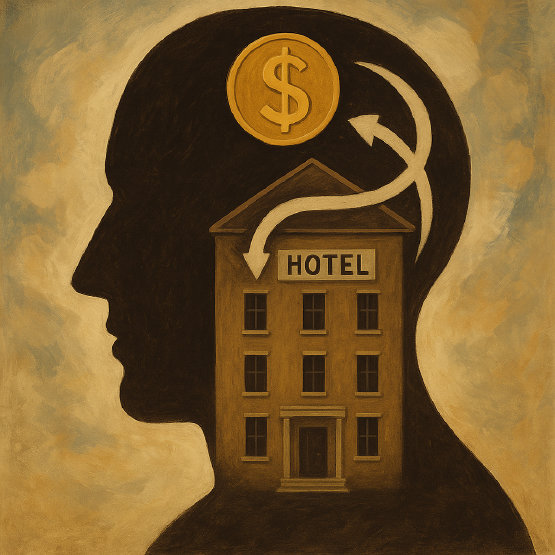To those who call hotel economics a meme
Concept of Hotel Economics
Economics is transcending the barriers of complex equations and statistics. Now, the goal of economics is not merely to find the right answers, but to enable more people to feel, understand, and participate in the economy. The concept that has emerged from this trend is 'hotel economics.' Initially used as a light example, this concept has gradually become an important bridge connecting academia and reality through the power of metaphor and intuition. For instance, the story of how a traveler's deposit circulates and expands within a small town encapsulates key principles of the economic system. It powerfully conveys that consumption is not simply about stopping, but about creating relationships and circulating value as a living flow.
The Role and Limits of Hotel Economics
Hotel economics plays a significant role in conveying this strong message through simplicity and intuitiveness. Without mathematical formulas or complex terminology, people can feel the flow of the economy within this narrative. This is precisely why economics does not seem abstract but instead becomes a part of 'my daily life.' However, we must not overlook that this analogy has its limitations. There is a perspective that views hotel economics as simply a 'meme' or 'fiction,' but this is a misunderstanding of the essence of the analogy. Thought experiments in economics focus more on the clarity of principles than on precise figures. Therefore, we can understand, engage, and create change through this.
Democratic Participation in Hotel Economics
One of the advantages of hospitality economics is that it has the ability to be easily accessible to everyone. For policymakers, this concept serves as a useful tool for prediction and persuasion. For instance, in tourism policies, local revitalization plans, and distribution network design, it can explain to people the 'why' and 'how' without complex data or figures. People tend to find meaning through stories rather than numbers. Therefore, hospitality economics serves as a foundation for democratic participation and empathy. This signifies an important turning point where the economy becomes the stories of people rather than just simple numbers.
Hotel Economics as a Flexible Thinking Model
Hotel economics is capable of encompassing various classes, generations, and industries thanks to its flexibility. This thinking can extend to multiple areas such as the sharing economy, digital content, and online shopping, while the central concept remains unchanged. It signifies that one consumption creates another value, and this value circulates to amplify the overall flow. Although the model may change as society evolves, the essence of hotel economics is still very much alive. Because of this characteristic, it can serve as a narrative of learning for students, a key for citizen participation, and a tool for policymakers' designs.
The Human Language of Economics
Another important aspect emphasized by hotel economics is the willingness to explain the economy in human language. This goes beyond merely providing easy explanations and seeks to connect through empathy. As a result of this approach, economics is no longer limited to the language of a few experts but evolves into a language for everyone's lives. Ultimately, the economy we desire should be one that more people can understand, imagine together, and enable themselves to engage with. Hotel economics tells that story, helping people intuitively understand the essence of circulation and value, connection and reproduction, even within simple lodging examples.
Exploring the Nature of the Economy
It is necessary to reflect on what we truly aim to achieve in economics. When complex theories lose the ability to resonate with people, we must return to storytelling. Hotel economics fundamentally values this aspect of storytelling. Economics is ultimately connected to people's lives, which is directly related to the relationships we have in the world we live in. Therefore, the economy we pursue should be based not on complex numbers and theories, but on communication and understanding among people.

Post a Comment